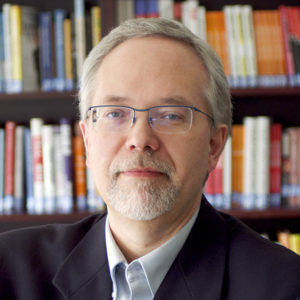 Although often misunderstood as a mere synonym for the church, the kingdom of God is much more to do with God’s plan to rescue our entire world from sin, dysfunction, and destruction. Michael Heiser, resident scholar for Logos Bible Software and host of the Naked Bible Podcast explained the kingdom in episode 37 like this:
Although often misunderstood as a mere synonym for the church, the kingdom of God is much more to do with God’s plan to rescue our entire world from sin, dysfunction, and destruction. Michael Heiser, resident scholar for Logos Bible Software and host of the Naked Bible Podcast explained the kingdom in episode 37 like this:
The kingdom of God began on earth, Eden. This is God’s original plan. He’s going to stick to it. The nations were disinherited and these are nations that were, again, on the earth. So to have the reversal, to have the nations reclaimed, and have the kingdom of God be what God originally intended it to be, that has to happen on the planet. It’s not an abstract thing we call the church, even though the church is the kingdom but the church is not yet the kingdom. It is but it isn’t the kingdom. It’s the current fruition; it’s the current progression of the kingdom. But we’re moving towards something that will be on earth.
Another reason I don’t like [the word] millennium is millennium limits it to 1000 years, and I don’t see it that way. I see it when this thing happens, when we have the second coming, and we have all things, again, brought to a head, brought to an end, it will be on this earth, and the Lord will be here. And the nations will be reclaimed, the nations that we are familiar with. It will be this planet, this globe. There will be believers given resurrection bodies. They will literally rule over the nations, as Revelation 3 says. You’re going to rule over angels, all this stuff. You will have human beings redeemed, glorified human beings, on a new earth which is, “heaven.” This will be the place where God dwells. This will be the place where we dwell with God. This will be the place for God’s divine agency of the divine beings who are loyal to him. They’re here, too. It is Eden globalized, and that is I think the picture, the eschatological picture, the end times picture that we need to have in our head.
I love the phrase “Eden globalized” to describe what God plans to do with our old world. What do you think of Heiser’s description?

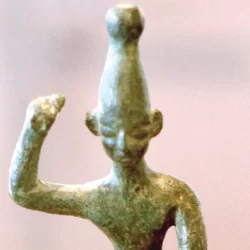
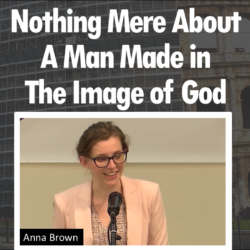
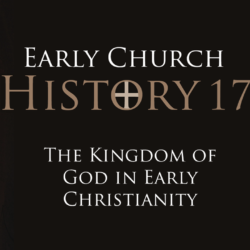
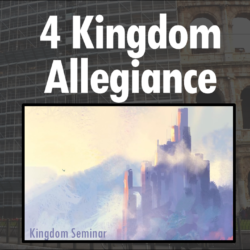

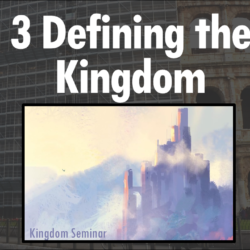
I have a question rather than a comment. Since the saints will rule the earth under Christ, having power over nations, as well as angels, whom (earthlings) will they be ruling? I’d imagine, not over themselves. Would they be ruling over unbelievers who some how survived the second coming of the Son?
Please , was this question answered ? I have the same question .
Stay tuned – your question is being processed.
Sorry for the delay, Gail.
Christ, and those saints who are resurrected and immortalised when Christ returns (cf. 1 Thess. 4:14-17; 1 Cor. 15:23), will rule over certain mortal human beings whilst on the Millennial Earth. There are various theories as to who these mortal human beings may be, such as :
(1). Non-Christian Jews who are nationally converted to Christ after He returns to Earth (cf. Romans chapters 9-11);
and/or,
(2). Non-Christian Gentiles (perhaps from remote areas of the pre-millennial Earth) who did not participate in Antichrist’s rebellion during the Battle of Armagedon (cf. Revelation 16:12-16; Isaiah 24: 6);
and/or,
(3). Relatively ‘righteous’, non-Christian Gentiles (cf. Romans 2:14-16), who at Christ’s return will be allowed to enter the Millennial Age, after having first successfully undergone the initial judgement (exclusively for non-Christians?) that is mentioned in Matt. 25:31-46 ;
and/or,
(4) People of all past Eras who have never heard of Christ’s Gospel, and who will be resurrected (sometime after Christ’s return) to be given an opportunity for salvation whilst upon the millennial Earth (On the alleged basis of 1 Tim. 2:4 – that God wants “everyone to be saved and to come to the knowledge of the truth…”)
“Already but not yet” – Kingdom now, Kingdom future. I think we should focus on both; this will enable us, as Christ’s representatives, to be the kind of people best qualified to help others to join with us and follow Jesus, as we strive to reflect the qualities of Christ and all his teachings. In this way we will progress towards the coming Kingdom when Jesus will return to set up his Kingdom on earth where we will rule with him over the nations and everything wrong with the world will be put right, and as Heiser puts it “Eden globalised.”
I love your teachings. Your books “Unseen Realm and Reversing Hermon” has changed my view on the Bible like I never knew it before. Thank you. I still need to get to read Demons and Angels. Use your commentaries on Hebrews and Leviticus too. It is really eye openers. Will get to the others too.
I have had to rethink my theology. I was taught the believers would rule and reign with Jesus over the nations on the New Earth. But if the New Earth is Heaven, then all the people on the New Earth is everyone that has entered into heaven: Believers who were taught they would receive special rewards for just being Christian, will find everyone is equal to the assigned task, because the goal is the same for all mankind. I understand that the glory of heaven is beyond our imagination so any Scriptures of a future glory with God is more than we could compare it to, in this life. But, here on earth, people are still motivated by punishment and reward. God knows that too. Perhaps the messages of the church is just God’s way of keeping people on track. . .
Good theology
I think you may be misapplying the idea of rule, as by necessity over a people group or groups. When we think of the government of heaven it is important to note it is not a government like this worlds government. It would be more like partnering with the Lord in the governance of His creation. Carrying out His will to maintain order in His creation. It is not a “Lording over others”, but instead a partnership with Him to maintain His order, do as He wills to be done in the future. Yes, at some point we will judge Angels, those that rebelled, but in eternity ruling and reigning is more about doing His will, maintaining His order, rather than “ruling over people.”
Why Heiser may sounded in some ways like he was an Amillennialists, at other times he sounded like a historic premillennialist. That is because he found none of the systems without their problems and took the position, that the nature of apocalyptic literature is somewhat ambiguous. Those who embrace a tradition and see eschatological believes as an in or out issue, will be highly critical of him. However, the truth is, if we do an honest look at church history, there have always been differences of opinions, Not unlike 2nd temple Jewish scholars were with all prophecies concerning the first coming. Before Jesus came they weren’t sure how to parse through some of the prophecies regarding the Messiah. They had different camps, as such those that held unwavering to their views, especially leaders, missed the signs, because of their traditional position and theology,
Irenaeus, called by Jerome “The Apostle” in the second century, was the spiritual grandson to the Apostle John through Polycarp, John’s spiritual son. Irenaeus stated that, and I am paraphrasing him, that prophecy can best be understood after the events described, Because only then can we see it all come together. Irenaeus, is considered the first post apostolic era theologian. His writings have been revered for 1900 years. By the way, much of the church would reject him and several other church fathers, because he was an Amillennialists. If this causes you to wonder where I might fall, not unlike Heiser, I think eschatology is not neatly unwrapped for us and therefor considering those with different views than ours to be wrong at best, and some would even call them heretics, is flat out wrong. We use that word, heretic, far too freely these days. Personally, I lean toward Historic Premillennialism, however, I can see the value of those scholars that lean into amillennialism as Irenaeus had. I think the Amillennialists view might be correct in the end, time will tell.
It is also important when looking at eschatology to understand the “Now and Not Yet” of the Kingdom, and more importantly, how does it fit into God’s design, His will for planet earth and reason for creating man and everything else the way He has. If Heaven and Earth will be one in the new heaven and new earth, which I believe the scripture is actually quite clear on, we need look no further than the last 3 chapters of Revelation. In this case how it fleshes out is not nearly as important as how we live out our faith. At the end of the day the most important issue is, Jesus is going to return, there will be a resurrection of the dead, the lawless will be judged, and His rule and reign here with us as His offspring, His living Temple, and His kingdom forever, will all be fulfilled. How we get there is less important than getting there and bringing as many with us as possible.
My two cents
Eschatology was Heiser’s least favorite subject. I am so glad that he did teach a little on it though. I concur with him fully, that all traditional positions encounter problems, and to overcome it in order to make it fit the system, you need to change the obvious meaning of some texts.
God has always done it this way. To keep us humble.
The chosen will be those who have been training now FOR the coming Kingdom, not training now IN a current Kingdom. They have the word of the Kingdom in them, not the Kingdom itself. Then comes millennial reign to teach surviving unbelieving nations, followed by a rebellion and test of those taught. Afterward a resurrection of all who have ever lived who still need to be given the same opportunity those mortals living into the millennium had (for an undisclosed period of time). This is all very logical, reasonable, and fair. Any monkeying around with Biblical terms leads to confusion and a loss of the Gospel’s full force.
I’m inclined to agree with you. I appreciate all 4 possibilities given but see none working scripturally.